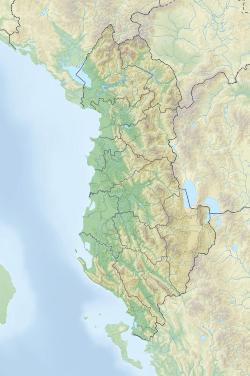Koritnik (Albanian definite form: Koritniku) is a wooded, limestone mountain, located in northeastern Albania and southwest Kosovo between the cities of Kukës and Prizren.[4] The mountain is entirely surrounded by branches of the White Drin river. The highest point of Koritnik massif, Maja e Pikëllimës reaches an elevation of 2,393 metres (7,851 ft) above the Adriatic. Gryka e Vanavës (English: Vanave Gorge) separates the mountain from Gjallica. The gorge is 3.5 km (2.2 mi) long, 30 m (100 ft) wide, and about 300 m (980 ft) deep.[5]
| Koritnik | |
|---|---|
 Mount Koritnik on the left from Pashtrik | |
| Highest point | |
| Elevation | 2,396 m (7,861 ft)[1] |
| Listing | Ultra |
| Coordinates | 42°5′0″N 20°34′0″E / 42.08333°N 20.56667°E |
| Geography | |
| Location | Kukës, Albania Prizren, Kosovo |
| Parent range | Korab Mountains[2] |
| Geology | |
| Rock age | Triassic[3] |
| Mountain type | Limestone |
The massif falls within the Balkan mixed forests terrestrial ecoregion of the Palearctic temperate broadleaf and mixed forests biome. The slopes of the mountain meadows are mostly covered with coniferous forests. The high pastures of the Koritnik mountain help sustain a population of around 60 chamois.
Koritnik is also part of the Korab-Koritnik Nature Park, forming the European Green Belt. It has been recognized as an Important Plant Area of international importance by Plantlife.[6]
See also
editReferences
edit- ^ "TREGUES SIPAS QARQEVE INDICATORS BY PREFECTURES" (PDF). Archived from the original (PDF) on 2011-07-24. Retrieved 2011-01-12.
- ^ "STRATEGJIA TERRITORIALE E NJËSISË VENDORE KUKËS" (PDF). kukesi.gov.al. p. 14. Archived from the original (PDF) on 2017-10-03. Retrieved 2017-10-02.
- ^ Kosovo: Sehenswürdigkeiten und Schönheiten (Dr. Dragan Ćukić ed.). Uros Maksimovic. 31 December 1970. pp. 11–12.
- ^ Quaternary Glaciations - Extent and Chronology: Part I: Europe. Elsevier. 8 June 2004. p. 383. ISBN 9780080540146.
- ^ "Kanioni i Vanave". akzm.gov.al (in Albanian). Archived from the original on 2019-03-07. Retrieved 2017-09-05.
- ^ IUCN, World Wide Fund for Nature, Plantlife. "Important Plant Areas of the south and east Mediterranean region" (PDF). portals.iucn.org. p. 75.
{{cite web}}: CS1 maint: multiple names: authors list (link)




